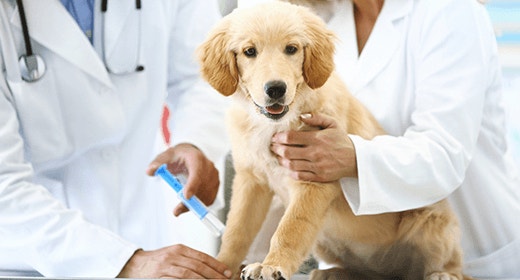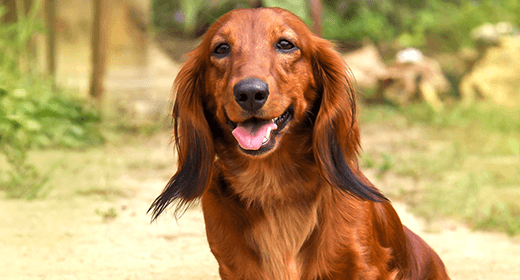

Your puppy's first visit to the vet will probably be more than just a quick hello. Get all the details from Veterinarian Dr. Katy Nelson as she talks about important details like how to properly bring your puppy into the vet's office and vaccinations he needs.
Your puppy's first veterinary checkup is about much more than simply greeting your dog's new vet, weighing in, and getting him his standard immunizations. Believe it or not, your first visit is just as much about educating yourself and answering your questions as it is about checking the health of your newest family member. Your first vet visit requires organization, preparation, and sometimes even some light note taking. Hi, I'm Dr. Katy Nelson with IAMS, and today we're talking about how to take your new puppy to his first veterinary appointment. Let's begin with what you'll need to bring to your first visit. First, you should find out what the breeder or shelter has already done for your puppy. They've probably given them some vaccinations. He probably has also been placed on a deworming schedule, and may even be on a heartworm preventative. And depending upon his breed, the tail may have been docked and the dewclaws removed. Your veterinarian will need all of this information, along with the puppy's approximate birth date. So it's important to bring all of your paperwork with you to your first veterinarian visit, so they can help you determine a schedule for completing immunizations, and determine when it's best to schedule spaying and neutering. Next you should bring a fresh stool sample to your first visit, so the veterinarian can check for parasites. Lastly, prepare a list of questions. After having your puppy home for a few days, there's no better time to ask questions than at your first visit with a medical professional. Ask other family members, too, if they have any questions that they'd like added to your list. Once you're prepared, bring your puppy's crate to the car, and do your best to secure it with available seat belts. Depending on the size and weight of the crate and the puppy, it's usually easier to secure the crate first, and then put your puppy inside. If you cannot fit a crate in your car, try purchasing a dog seat belt that is specifically designed to restrain and protect your puppy in case of an accident. This next piece of information is critical. Carry your puppy into the doctor's office. Do not let him interact with any other animals in the office. Though the other animals may be perfectly healthy themselves, your puppy can still get very sick from even just rubbing noses with another dog until his vaccinations and immunity against disease is further developed. After greeting you and your new pup, your vet will likely begin examining your pup as she continues to converse and answer your questions. She'll check your puppy's weight, temperature, heart, lungs, ears, genitals, eyes, nose, skin, anal region, mouth, and gums for both basic and breed abnormalities. Your puppy needs to learn to be comfortable being handled by others. Remaining calm and peaceful in the new environment with the vet or any other stranger will allow your puppy to do the same. Depending on the status of your puppy's records and stool exam, your puppy will also begin the deworming process, receive the following initial vaccines: rabies, distemper, and Bordatella. If your puppy's exposed to other dogs in boarding, public dog parks, training, and other situations, then based on geography and lifestyle, ask your veterinarian which vaccines they recommend for your puppy. Also, ask your vet about microchipping, and when it is safe to begin socializing and training your pup. Following the initial visit, your veterinarian will ask that you return to booster the vaccines until your puppy reaches a certain age. The time between boosters typically ranges between two and four weeks. Here are some signs that your puppy needs immediate medical care: allergic reactions or swelling around the face, hives-- this is most easily seen on the belly or face-- any eye injuries, any respiratory problems, any signs of pain-- panting, labored breathing, increased body temperature, lethargy, restlessness, or loss of appetite-- any suspected poisoning, any open wound, a seizure, fainting, or collapse, snake bites, thermal stress-- either too hot or too cold-- trauma, like if he's hit by a car, even if he seems fine, vomiting or diarrhea more than two or three times within an hour. I'm Dr. Katy Nelson with IAMS, and I hope that you found this helpful as you welcome your new addition to the family.


Nutrients such as protein, fat, vitamins, and minerals are important players in the skin and coat health of dogs. To understand the role of these nutrients, it is necessary to start by understanding skin and hair.
The purpose of skin and hair is to block things from leaving (such as water or heat) or entering (such as viruses and bacteria) the body.
The hair coat is composed almost entirely of protein. If the animal's diet doesn't contain adequate protein quantity and quality, hair may fall out, or become dry, weak and brittle.
Skin is made up of squamous cells, flat cells tightly packed together. These cells have tough membranes that are composed of proteins and fats. Without proper amounts of these nutrients, cell membranes weaken, allowing water to escape and bacteria and viruses to enter more easily.
Proteins are found in both animal-based and plant-based ingredients. Animal-based proteins contain all the essential amino acids dogs need, whereas plant-based proteins may contain only some essential amino acids. Animal-based proteins help dogs achieve optimal health.
Fats can also be found in both animal-based and plant-based ingredients. They are incorporated into skin cells as fatty acids. There are two essential fatty acids for skin and coat health. Linoleic acid maintains skin and coat condition in dogs. Without enough linoleic acid dogs may experience dull, dry coat, hair loss, greasy skin and increased susceptibility to skin inflammation.
Both of these essential fatty acids are omega-6 fatty acids and are found in animal tissues like chicken fat. Linoleic acid is also found in some vegetable oils, such as corn and soybean oils.
Most commercial dog diets contain more than adequate amounts of omega-6 fatty acids. Because these fatty acids can be converted to compounds that increase susceptibility to skin inflammation, it is important to balance the amount of omega-6 fatty acids in the diet with omega-3 fatty acids, which reduce susceptibility to inflammation.
Omega-3 fatty acids are found in oils from fish and some plants (canola and flax).
IAMS research has found that combining fat sources in the diet at a ratio of 5-10 omega-6 fatty acids to 1 omega-3 fatty acid results in excellent skin and coat health.
Vitamins and minerals are essential for the development of healthy skin and hair coat. The best way to provide these nutrients is through a complete and balanced diet containing appropriate amounts of essential vitamins and minerals rather than through supplements.
| Vitamin or Mineral | Importance to Skin and Coat Health |
|---|---|
| Vitamin A | Necessary for growth and repair of skin |
| Vitamin E | Protects skin cells from oxidant damage |
| Biotin | Aids in the utilization of protein |
| Riboflavin (B2) | Necessary for fat and protein metabolism |
| Zinc | Necessary for fat and protein metabolism |
| Copper | Involved in tissue pigment and protein synthesis |
Diet is often believed to be a factor when changes in skin and coat condition are noticed. The most common causes of these changes, however, are season and life stage.
As cold weather approaches, most dogs grow a thick coat to help keep heat in and cold air out. As the weather begins to warm up, they shed the thick, heavy coat.
Most puppies are born with soft fuzzy hair, but as they age, a coarser coat grows. Pregnant or lactating dogs also may experience a change in coat condition or hair loss. And, as with humans, the hair on dogs may thin out and become coarser and white as they reach their senior years.